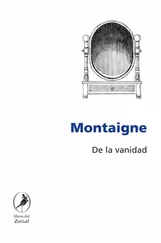Michel de Montaigne - Essays
Здесь есть возможность читать онлайн «Michel de Montaigne - Essays» — ознакомительный отрывок электронной книги совершенно бесплатно, а после прочтения отрывка купить полную версию. В некоторых случаях можно слушать аудио, скачать через торрент в формате fb2 и присутствует краткое содержание. Жанр: unrecognised, на английском языке. Описание произведения, (предисловие) а так же отзывы посетителей доступны на портале библиотеки ЛибКат.
- Название:Essays
- Автор:
- Жанр:
- Год:неизвестен
- ISBN:нет данных
- Рейтинг книги:3 / 5. Голосов: 1
-
Избранное:Добавить в избранное
- Отзывы:
-
Ваша оценка:
- 60
- 1
- 2
- 3
- 4
- 5
Essays: краткое содержание, описание и аннотация
Предлагаем к чтению аннотацию, описание, краткое содержание или предисловие (зависит от того, что написал сам автор книги «Essays»). Если вы не нашли необходимую информацию о книге — напишите в комментариях, мы постараемся отыскать её.
Essays: The Philosophy Classic
Essays: The Philosophy Classic
Essays — читать онлайн ознакомительный отрывок
Ниже представлен текст книги, разбитый по страницам. Система сохранения места последней прочитанной страницы, позволяет с удобством читать онлайн бесплатно книгу «Essays», без необходимости каждый раз заново искать на чём Вы остановились. Поставьте закладку, и сможете в любой момент перейти на страницу, на которой закончили чтение.
Интервал:
Закладка:
Mors! Utinam pavidos vitae subducere nolles.
Sed virtus to sola daret!
[O death! wouldst that thou might spare the coward, but that valour alone should pay thee tribute.
—Lucan, Pharsalia , iv. 580.]
Now, let us leave these boastful courages. Theodorus answered Lysimachus, who threatened to kill him, “Thou wilt do a brave feat,” said he, “to attain the force of a cantharides.” The majority of philosophers are observed to have either purposely anticipated, or hastened and assisted their own death. How many ordinary people do we see led to execution, and that not to a simple death, but mixed with shame and sometimes with grievous torments, appear with such assurance, whether through firm courage or natural simplicity, that a man can discover no change from their ordinary condition; settling their domestic affairs, commending themselves to their friends, singing, preaching, and addressing the people, nay, sometimes sallying into jests, and drinking to their companions, quite as well as Socrates?
One that they were leading to the gallows told them they must not take him through such a street, lest a merchant who lived there should arrest him by the way for an old debt. Another told the hangman he must not touch his neck for fear of making him laugh, he was so ticklish. Another answered his confessor, who promised him he should that day sup with our Lord, “Do you go then,” said he, “in my room [place]; for I for my part keep fast to-day.” Another having called for drink, and the hangman having drunk first, said he would not drink after him, for fear of catching some evil disease. Everybody has heard the tale of the Picard, to whom, being upon the hangman's ladder, they presented a common wench, telling him (as our law does sometimes permit) that if he would marry her they would save his life; he, having a while considered her and perceiving that she halted: “Come, tie up, tie up,” said he, “she limps.” And they tell another story of the same kind of a fellow in Denmark, who being condemned to lose his head, and the like condition being proposed to him upon the scaffold, refused it, by reason the girl they offered him had hollow cheeks and too sharp a nose. A servant at Toulouse being accused of heresy, for the sum of his belief referred himself to that of his master, a young student, prisoner with him, choosing rather to die than suffer himself to be persuaded that his master could err. We read that of the inhabitants of Arras, when Louis XI took that city, a great many let themselves be hanged rather than they would say, “God save the King.” And amongst that mean-souled race of men, the buffoons, there have been some who would not leave their fooling at the very moment of death. One that the hangman was turning off the ladder cried: “Launch the galley,” an ordinary saying of his. Another, whom at the point of death his friends had laid upon a bed of straw before the fire, the physician asking him where his pain lay: “Between the bench and the fire,” said he, and the priest, to give him extreme unction, groping for his feet which his pain had made him pull up to him: “You will find them,” said he, “at the end of my legs.” To one who being present exhorted him to recommend himself to God: “Why, is someone going to Him?” said he; and the other replying: “It will presently be yourself, if it be His good pleasure.” “Shall I be sure to be there by to-morrow night?” said he. “Do, but recommend yourself to Him,” said the other, “and you will soon be there.” “I were best then,” said he, “to wait and carry my recommendations myself.”
In the kingdom of Narsingah to this day the wives of their priests are buried alive with the bodies of their husbands; all other wives are burnt at their husbands’ funerals, which they not only firmly but cheerfully undergo. At the death of their king, his wives and concubines, his favourites, all his officers, and domestic servants, who make up a whole people, present themselves so gaily to the fire where his body is burnt, that they seem to take it for a singular honour to accompany their master in death. During our late wars of Milan, where there happened so many takings and retakings of towns, the people, impatient of so many changes of fortune, took such a resolution to die, that I have heard my father say he there saw a list taken of five-and-twenty masters of families who made themselves away in one week's time: an incident somewhat resembling that of the Xanthians, who being besieged by Brutus, fell – men, women, and children – into such a furious appetite of dying, that nothing can be done to evade death which they did not to avoid life; insomuch that Brutus had much difficulty in saving a very small number. [“Only fifty were saved.” – Plutarch, Life of Brutus , c. 8.]
Every opinion is of force enough to cause itself to be espoused at the expense of life. The first article of that valiant oath that Greece took and observed in the Median war, was that everyone should sooner exchange life for death, than their own laws for those of Persia. What a world of people do we see in the wars between the Turks and the Greeks, who would rather embrace a cruel death than uncircumcise themselves to be baptised? An example of which no sort of religion is incapable.
The kings of Castile having banished the Jews out of their dominions, John, King of Portugal, in consideration of eight crowns a head, sold them a retreat into his for a certain limited time, upon condition that the time fixed coming to expire they should begone, and he to furnish them with shipping to transport them into Africa. The day comes, which once lapsed they were given to understand that such as were afterward found in the kingdom should remain slaves; vessels were very slenderly provided; and those who embarked in them were rudely and villainously used by the passengers, who, besides other indignities, kept them cruising upon the sea, one while forwards and another backwards, till they had spent all their provisions, and were constrained to buy of them at so dear a rate and so long withal, that they set them not on shore till they were all stripped to the very shirts. The news of this inhuman usage being brought to those who remained behind, the greater part of them resolved upon slavery and some made a show of changing religion. Emmanuel, the successor of John, being come to the crown, first set them at liberty, and afterwards altering his mind, ordered them to depart his country, assigning three ports for their passage. He hoped, says Bishop Osorius, no contemptible Latin historian of these later times, that the favour of the liberty he had given them having failed of converting them to Christianity, yet the difficulty of committing themselves to the mercy of the mariners and of abandoning a country they were now habituated to and were grown very rich in, to go and expose themselves in strange and unknown regions, would certainly do it. But finding himself deceived in his expectation, and that they were all resolved upon the voyage, he cut off two of the three ports he had promised them, to the end that the length and incommodity of the passage might reduce some, or that he might have opportunity, by crowding them all into one place, the more conveniently to execute what he had designed, which was to force all the children under fourteen years of age from the arms of their fathers and mothers, to transport them from their sight and conversation, into a place where they might be instructed and brought up in our religion. He says that this produced a most horrid spectacle the natural affection between the parents and their children, and moreover their zeal to their ancient belief, contending against this violent decree, fathers and mothers were commonly seen making themselves away, and by a yet much more rigorous example, precipitating out of love and compassion their young children into wells and pits, to avoid the severity of this law. As to the remainder of them, the time that had been prefixed being expired, for want of means to transport them they again returned into slavery. Some also turned Christians, upon whose faith, as also that of their posterity, even to this day, which is a hundred years since, few Portuguese can yet rely; though custom and length of time are much more powerful counsellors in such changes than all other constraints whatever. In the town of Castelnaudari, fifty heretic Albigeois at one time suffered themselves to be burned alive in one fire rather than they would renounce their opinions.
Читать дальшеИнтервал:
Закладка:
Похожие книги на «Essays»
Представляем Вашему вниманию похожие книги на «Essays» списком для выбора. Мы отобрали схожую по названию и смыслу литературу в надежде предоставить читателям больше вариантов отыскать новые, интересные, ещё непрочитанные произведения.
Обсуждение, отзывы о книге «Essays» и просто собственные мнения читателей. Оставьте ваши комментарии, напишите, что Вы думаете о произведении, его смысле или главных героях. Укажите что конкретно понравилось, а что нет, и почему Вы так считаете.












